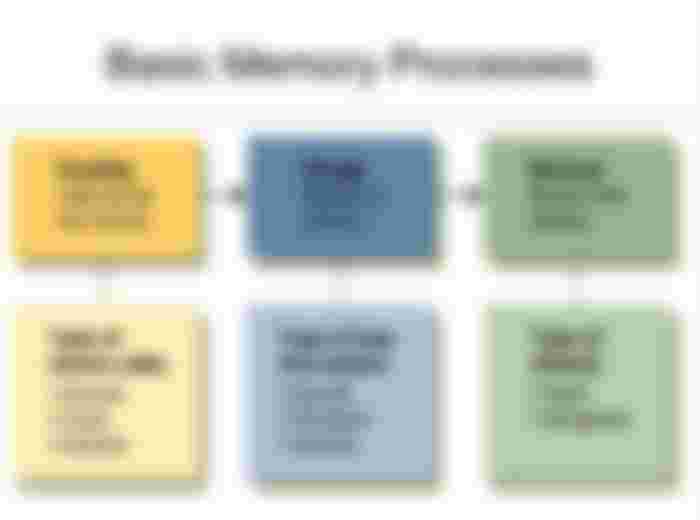I have no doubt about, that our memories is one of the most important things in our lives, since they include our story of our lives, decisive events, different kinds of people, vital information and basically everything, that makes us the way we are today. However I wonder how those memories can be trusted, how accurate is what we remember. Situations, events, people and many more things. Can our memories be manipulated by other people? I am giving you the answers to these and similar questions in this article.
How Our Memory Works
Do not worry I am not going to go deep into it and give you a scientific study about how our brain works. Let's see the process how can an error happen, that may gives us false memories or inaccurate details of an event, that happened in the past. We prone to consider our memories most of the times are accurate. Obviously as years and decades pass they slowly fade away, but they tend to work well.

We often use computers as an analogy to explain how memory works as we enter information, store them in different places and then recall them whenever we need them. This analogy is not very accurate. Human brain is more complex. There are three key steps when we remember for something. Encoding, storage and retrieval and there can be an error in each steps, that can affect our memory.
When encoding we perceive and interpret the outside world's stimuli, but a distortion can happen at the first step, because of our distortion of organ of senses, different mental and cognitive process, emotions and many other factors.
In the process of storing our information, our brain differs the most important and the less important information and attaches emotions and interpretations to them.

In the last step of the process, when we retrieve our memories we are simple unable to recall every detailed events, colors or numbers whatever the case may be. A sort of reconstruction, recreation take place in our minds. That's why we call it reconstructive memory. Everybody is different and every person retrieve the same memory in different ways due to different senses and inner mental processes.
Retrospective Falsification
An interesting subject of the retrieval distortion is the retrospective falsification, when we alter our memories to suit our inner psychological needs whether we do it deliberately or undeliberate or the mixture of the two. For instance when a couple being divorced they tell the same reason of their divorce in two different ways. The more they tell their own story the better will they remember for it and eventually they cannot be convinced, that it was not that way they told.
A very simple thing can influence, how we remember things. For example it matters how a question was asked about an event. Even just one word can make a huge impact on the answers.
Elizabeth F. Loftus and John C. Palmer did two experiments, where they tried to measure the accuracy of the retrieval.
Reconstruction of automobile destruction: An example of the interaction between language and memory
Two experiments are reported in which subjects viewed films of automobile accidents and then answered questions about events occurring in the films. The question, “About how fast were the cars going when they smashed into each other?” elicited higher estimates of speed than questions which used the verbs collided, bumped, contacted, or hit in place of smashed. On a retest one week later, those subjects who received the verb smashed were more likely to say “yes” to the question, “Did you see any broken glass?”, even though broken glass was not present in the film. These results are consistent with the view that the questions asked subsequent to an event can cause a reconstruction in one's memory of that event.
Source: https://www.sciencedirect.com/science/article/abs/pii/S0022537174800113
Experiment One
Method: In the laboratory, the sample was 45 students and there were five different conditions. Each participant only experienced one condition. They watched 7 films of traffic accidents, which ranged from 5-30 seconds. They were presented in random order to each group. The participants were then asked to describe what happened as if they witnessed the event. They were asked specific questions, such as “About how fast were the cars going when they (smashed/collided/bumped/hit/contacted) each other?”

Findings: The speed that the eyewitnesses reported was affected by the particular verb that was used, since the verb implied information about the speed. This in turn, affected the participants’ memory of the accident.
The following average speed was reported for each word:
Smashed: 40.8 mph
Collided: 39.3 mph
Bumped: 38.1 mph
Hit: 34 mph
Contacted: 31.8 mph
Conclusion: This study shows that the verb gave an impression regarding the speed of the car, which altered the participants’ perceptions. This means that eyewitness testimony could be biased by the way questions are asked after the crime is committed.
Experiment Two
Method: 150 students were shown a one minute film, which featured a car driving through the countryside followed by four seconds of a multiple traffic accident. They were then questioned about the film. 50 students were asked, “How fast were the cars going when they hit each other?” 50 students were asked, “How fast were the cars going when they smashed each other?” And the remaining 50 participants were not asked a question at all (control group).
One week later, without seeing the film again, they answered 10 questions. One of the questions was, “Did you see any broken glass?” There was no broken glass on the original film.
Findings: Participants who were asked how fast the cars were going when they smashed were more likely to report seeing broken glass.
Conclusion: This research suggests that memory and eyewitness accounts can be easily distorted with this questioning technique.
References
Loftus, E. F., & Palmer, J. C. (1974). Reconstruction of auto-mobile destruction: An example of the interaction between language and memory. Journal of Verbal Learning and Verbal Behavior, 13, 585-589.
Source: https://moderntherapy.online/blog-2/loftus-and-palmer-study-explained
Feel free to leave a comment below what do you think about memories, how important they are for you and how accurate they were, when you remembered for something. Has it ever happened to you that you remembered something and later you found out it was not exactly how you remembered?





thanks for these I can now try it in my family